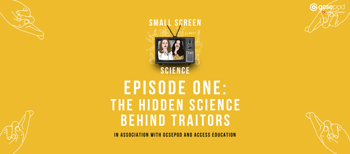
The podcast episode tackles everything from how our brains process deception to the surprising science behind one of the show's most dramatic challenges. And yes, they even explore the secrets behind Claudia's impossibly shiny hair! Does being a psychopath or sociopath give you an advantage? How can we use psychology to spot a lie? What facial features make someone appear more trustworthy?
Watch…
Spotify: https://open.spotify.com/show/7ka0hbd2EX0ZjvFBqnBDMU
Apple: https://podcasts.apple.com/gb/podcast/small-screen-science/id1511181067
Fun fact
Did you know lying skills peak during young adulthood? The University of Amsterdam's Ig Nobel Prize-winning research shows our deception abilities follow a clear developmental curve - improving through childhood, peaking in our young adult years, and then gradually declining with age. So those twenty-somethings on the show? Statistically more likely to be effective liars!
Challenge
Listener challenge: We’re all intrigued by the psychology of deception in “Traitors”. Research contestant Charlotte from the show and discover why she faked a Welsh accent during her time on the series. Was this a good strategy? What does research tell us about the Welsh accent? What psychological advantage was she seeking?
Access GCSEPod Science Resources
Want to use this episode in your classroom? Here are some discussion points to explore with students:
- How can understanding the science of deception help us be more discerning in everyday life?
- What ethical considerations arise when we study and discuss sociopathic or psychopathic behaviours?
- How do our biases about "trustworthy appearances" impact our judgment of others?
- How do researchers design experiments to study deception in controlled environments?
Listen to the full episode of Small Screen Science wherever you get your podcasts!
Spotify: https://open.spotify.com/show/7ka0hbd2EX0ZjvFBqnBDMU
Apple: https://podcasts.apple.com/gb/podcast/small-screen-science/id1511181067

 AU & NZ
AU & NZ
 SG
SG
 MY
MY
 US
US
 IE
IE

